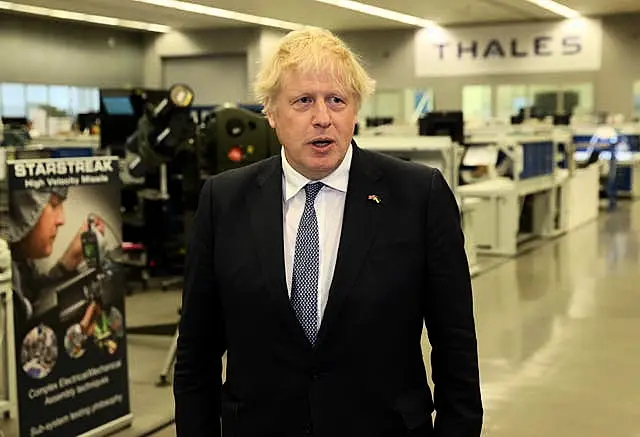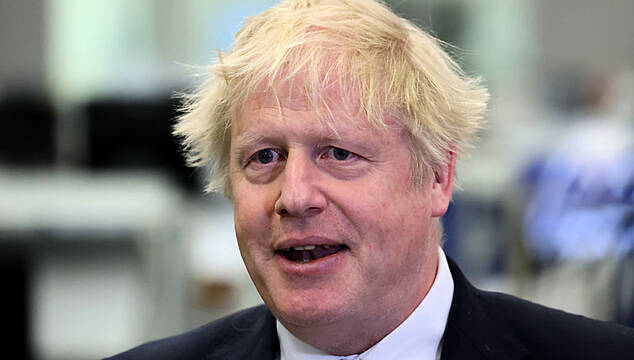Boris Johnson said his plan to legislate to rip up Northern Ireland’s post-Brexit trading arrangements was an “insurance” policy if a fresh deal could not be reached with the European Union.
The row over the Northern Ireland Protocol has created an impasse in efforts to form a new executive in Stormont, with the Democratic Unionist Party refusing to join a new administration unless its concerns over the arrangements are addressed.
The UK's prime minister travelled to Belfast to meet leaders of the Stormont parties in an attempt to secure progress – but Mr Johnson also used the trip to issue a warning to Brussels that the UK is prepared to rewrite unilaterally the terms of the Brexit deal he signed.
The move could risk a trade war with the EU, but Mr Johnson is frustrated that talks with Brussels to resolve the protocol problems have not made sufficient progress.

“None of the parties – I spoke to all five parties just now – not one of them likes the way it’s operating, they all think it can be reformed and improved,” the prime minister told reporters in Belfast.
Mr Johnson said “we would love this to be done in a consensual way with our friends and partners” in Brussels, “ironing out the problems, stopping some of these barriers” to goods crossing the Irish Sea from Britain.
“But to get that done, to have the insurance, we need to proceed with a legislative solution at the same time.”
UK foreign secretary Liz Truss is expected to set out plans for legislation to rewrite the protocol when she addresses MPs at Westminster on Tuesday.
The row over the protocol has prevented the formation of a new executive, with Sinn Féin’s president accusing Mr Johnson of “placating” the DUP over the issue.
Mr Johnson insisted he encouraged the DUP to join a new administration, saying: “I think everybody should be rolling up their sleeves and getting stuck into the government of Northern Ireland.”
He added: “The issue they have is that they object to the operation of the protocol. We don’t want to scrap it, but we think it can be fixed.”
Sinn Féin’s president Mary Lou McDonald described a “fairly tough” meeting with Mr Johnson at Hillsborough Castle.
“It’s very clear to us that despite all of the rhetoric from the British government about re-establishing the Executive here in the north, that in fact their priority is placating the DUP,” she said.
She added: “We have said directly to him that proposed unilateral act of legislating at Westminster is wrong.
“It seems to us absolutely extraordinary that the British government would propose to legislate to break the law. It’s an extraordinary proposal and one that would amplify the bad faith with which the Tory government has conducted itself from the beginning of the entire Brexit debacle.”

DUP leader Jeffrey Donaldson “set out in very clear terms” to Mr Johnson what he believed is needed.
“We cannot go on like this,” the DUP leader said after meeting Mr Johnson.
“Clearly, we want a fully functioning executive and we want that to happen as soon as possible, and therefore, we’re looking now to the government.
“That’s what we’re looking for from our government, from our prime minister, it’s decisive action on the protocol.
“We’ve heard the words, now we need to see the action,” he added.
Mr Johnson was booed and jeered by around 200 people who gathered at the gates of Hillsborough Castle as his cavalcade drove in.
Protesters, including campaigners for the Irish language, victims campaigners and anti-Brexit activists, were among the crowds who held aloft banners.

Mr Donaldson rejected the suggestion that Mr Johnson was picking sides in the row over the protocol.
He said: “This is the same Sinn Féin who were in Dublin this morning asking the Irish government to take their side.
“Sinn Féin do double standards very well.”
Taoiseach Micheál Martin said the deadlock between the UK and the EU can only be solved through “substantive talks” between the two sides.
Ireland’s Minister for Foreign Affairs Simon Coveney, who was in Brussels on Monday for talks with EU counterparts, warned that the entire UK-EU Trade and Co-operation Agreement deal – the TCA – could be jeopardised if Mr Johnson takes unilateral action on the protocol.
Acting unilaterally “means tension, rancour, stand-offs, legal challenges and of course calls into question the functioning of the TCA itself, because the TCA and the Withdrawal Agreement are interlinked, they rely on each other”, he said.

Northern Ireland’s 1998 Good Friday/Belfast peace agreement contains provisions to protect and develop relations both on a north/south basis on the island of Ireland and on an east/west basis between the island and Britain.
Mr Johnson claims the protocol has upset this “delicate balance” of unionist and nationalist aspirations by undermining the east/west dynamic.
A majority of MLAs in Stormont’s newly-elected Assembly represent parties that support retaining the protocol, claiming that it offers Northern Ireland some protection from the negative economic consequences of Brexit.
They point to the unfettered access Northern Ireland traders have to sell into the EU single market as a key benefit of the protocol.
But the new Assembly has been unable to convene due to the DUP’s refusal to engage in the institutions until major changes to the protocol are secured.
The Stormont election saw Sinn Féin displace the DUP to become the overall largest party in Northern Ireland for the first time.
The DUP remains the largest unionist party in the region and, under Stormont rules, a new executive cannot be formed unless it agrees to nominate to the post of deputy first minister.
The DUP has also blocked the nomination of a new Assembly speaker, meaning the legislature at Parliament Buildings cannot meet while the impasse continues.
Contention over the protocol was not the sole focus of Mr Johnson on Monday as he used his visit to pledge delivery of three pre-existing commitments: a stalled language and culture package; ensuring women and girls have full access to abortion services; and introducing new measures to deal with the legacy of the past.







